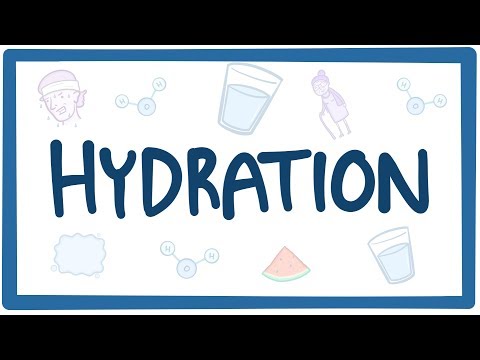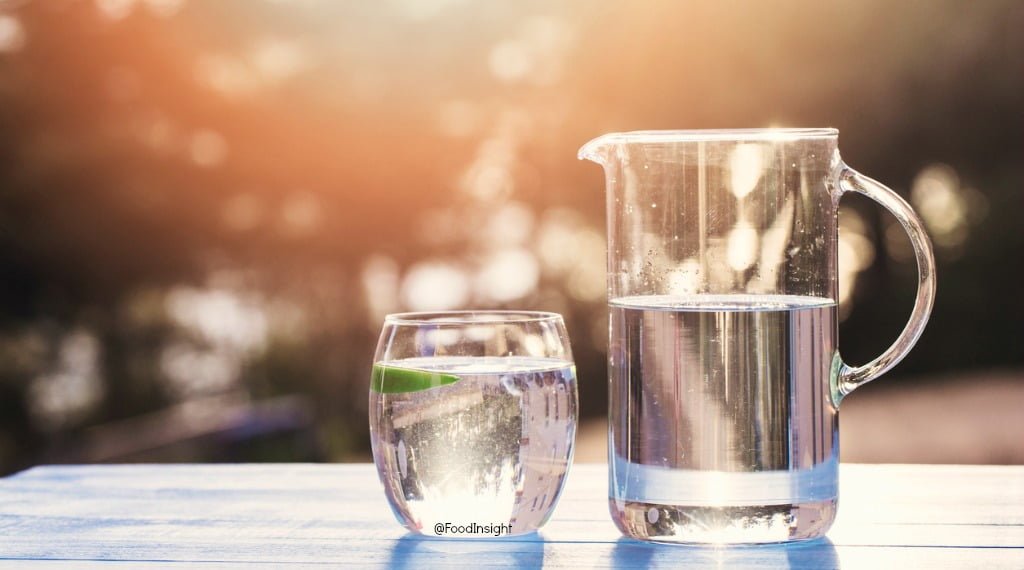This is the second installment of a new video series in partnership with Osmosis, a group that focuses on health science education, highlighting the basics of several nutrition topics. Click here to watch the first video in the series, “Fundamentals of Fats”.
Water is essential for human life. It makes up more than 50 percent of a person’s body weight, and it’s directly involved in every biochemical reaction in our body. Staying hydrated is important because water does so many important things in the body. It’s critical for digestion: The water in saliva moistens food when we chew and it serves as a fluid environment in which digestive enzymes break down our meals. Water forms the bulk of blood, which allows oxygen and glucose to move around the body, and it plays a role in eliminating toxins through urination. Water can also help with weight loss and maintaining a healthy body weight — replacing sweetened drinks with water reduces calorie intake and drinking water before and during a meal can increase our sense of fullness and prevent overeating. Ultimately, maintaining the right balance of water in our body is what keeps us alive.
Total body water can be subdivided into two major compartments: the fluid inside our cells, known as intracellular fluid, and fluid outside our cells, called extracellular fluid. Extracellular fluid is made up of blood, and the fluid found between cells in the interstitial tissue. Both inside and outside the cells, water acts as a solvent to dissolve electrolytes like sodium, potassium, calcium, magnesium, chloride, bicarbonate, phosphate and sulfate, which are kept at very specific concentrations.
About 80 percent of our water intake comes from drinking fluids. The recommended daily fluid intake for women is around 11 glasses of water, or 2.2 liters, and for men it’s about 13 glasses, or 3 liters. Plain water is the ideal choice when it comes to hydration, but all fluids, including caffeinated drinks like coffee and tea, or flavored waters and juices, contribute to water intake. The other 20 percent of our water intake comes from the food we eat. Water content in food varies, with some fruits and vegetables, like watermelon or strawberries, being as high as 90 percent water by weight.
Water leaves our bodies through urine, sweat, breath and bowel movements. When we’re properly hydrated, the kidneys produce between 800 and 2,000 milliliters of urine every day, and the urine has a pale yellow shade — like lemonade. Some water, around 200 milliliters per day, is also lost during bowel movements. Glands in our skin increase sweat production when we’re nervous, when it’s really hot outside or during exercise. The amount of sweat we lose each day varies based on the level of activity and the person. On average, it ranges from 500 to 700 milliliters per day, even though some athletes can sweat more than a liter in an hour when it’s really hot! Finally, there’s the “insensible” water losses that we don’t really notice, like breathing or evaporation through our skin, which account for 600 to 900 milliliters per day — a lot to lose without even really sensing it!
When water losses exceed intake, dehydration sets in. There are many causes of dehydration: vigorous exercise, not drinking enough fluids throughout the day, vomiting, diarrhea, excessive sweating or an inability to swallow, to name a few. Dehydration can also result from using diuretics — substances like alcohol or certain medications. Dehydration typically causes thirst, dry mouth and lips, nausea, fatigue and lightheadedness, as well as a darkening of the urine color or a decrease in urination. A loss of as little as 2 percent of our body weight due to water losses can lead to irritability, difficulty concentrating and headaches.
There are some circumstances in which a person might become dehydrated, like traveling on an airplane, being in hot weather or engaging in extended strenuous physical activity. Air inside airplanes is drier than the air on the ground, so a flight longer than two hours can lead to dehydration. Drinking fluids before and during a flight can help prevent that.
Playing sports or doing heavy physical labor, both of which make us sweat more, can lead to a loss of both water and electrolytes. In the majority of situations, water- and electrolyte-containing foods can help replace the losses, but replenishing with an electrolyte-containing drink may help avoid dehydration in longer-duration activities like running a marathon or working outside in hot weather. The best way to avoid becoming dehydrated is to monitor your urine color and drink fluids before you get thirsty. Pay close attention because once the thirst sensation is present, dehydration is already underway.
This blog includes contributions from Kris Sollid, RD.

This video was partially supported by a grant from PepsiCo Inc., Nutrition R&D.
